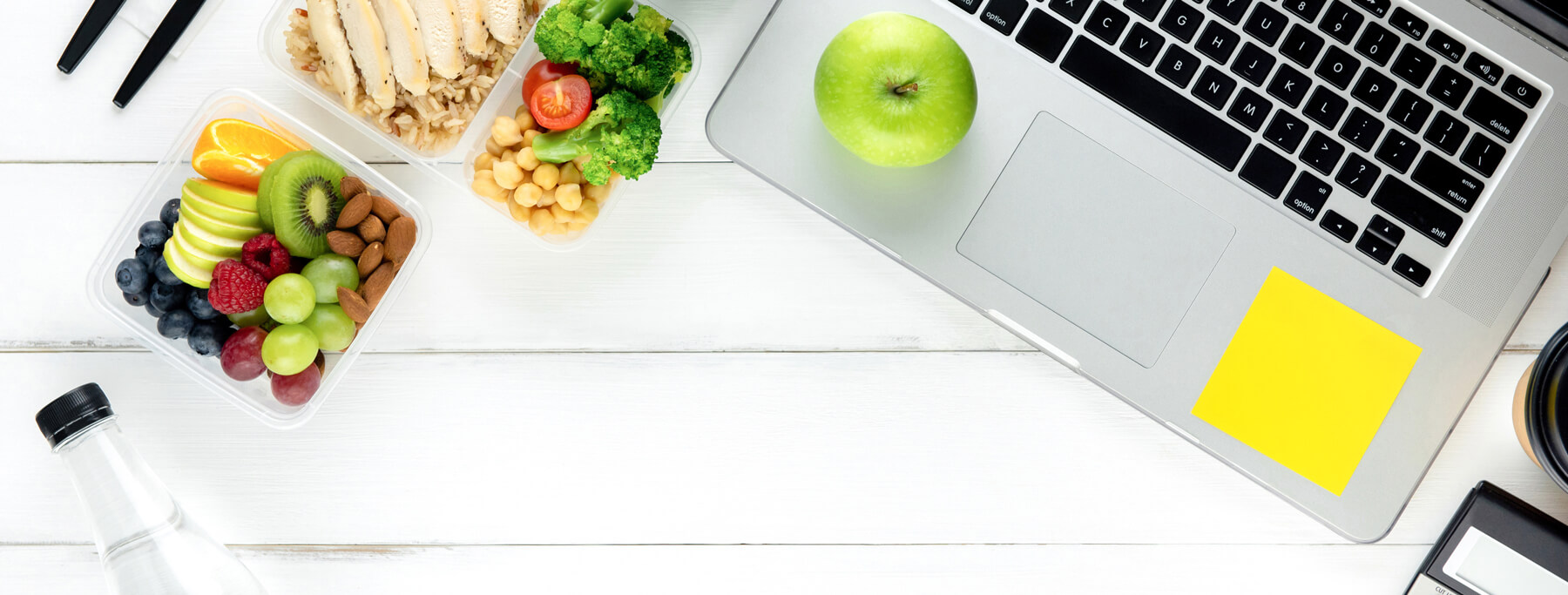
Healthy eating can sometimes feel a bit more complicated than we anticipated – especially when we’re working from home. Working from home can lead to some unhealthy habits – it’s relatively easy to over-snack or not get enough sleep which can lead us to crave unhealthy foods. To help you avoid some of these common, remote work eating pitfalls, we’ve put together a list of tips to help you eat healthier and feel better while working from home.
Plan your meals.
If we have a healthy recipe for every night of the week, it makes it a whole lot easier to grocery shop and only buy necessary food items. We’re a lot less wasteful this way too. Every night doesn’t have to be a complicated recipe, there are plenty of healthy, ready in 30-minute recipes. Allow one night a week for a clean the fridge crockpot, leftovers, or breakfast for dinner. For a list of healthy recipe ideas, see our “Sub this for That” blog.
Meal Prep.
The last thing we want to do during our short lunch hour is cook. Make extra the night before so you have nice leftovers to heat up. Or consider meal prepping your breakfasts and lunches at the beginning of the week for a delicious and nutritious grab and go meal. Click here for some quick and easy meal prep ideas.
Drink TONS of water.
Keep a water bottle at your desk at all times and refill it throughout your day. A lot of times we confuse being thirsty for being hungry. When we’re sufficiently hydrated, our hormones are in balance, and we’re much less likely to over-consume. Water is also vital to helping all of our organs function properly.
Avoid excess caffeine.
Watch how much caffeine you are drinking. If you brew a whole pot at home, you don’t have your co-workers to help you finish it throughout the day! Also, be mindful of what time of day you’re having caffeine. Caffeine past noon can really interrupt your sleep habits and cause other unexpected problems.
Keep healthy snacks on hand.
When we hit the grocery store, it’s easy to be tempted to stock up on non-perishables and other items that don’t have the same nutritional value as whole foods. Science has proven that processed snacks and foods can actually make us hungrier, more irritable, or lethargic. Stock up on whole foods like raw nuts (brazil nuts are great for our heart and thyroid), apples, oranges, grapes, carrots, bell peppers, and avocados. Healthy dips like hummus help fill us up. Hard-boiled eggs are also an easy source of protein!
Take a break!
Take time to enjoy your lunch and relax and try not to eat at your desk. You need a break from your computer screen! Plus, studies show that when we concentrate on eating and nothing else, we eat less and chew our food better, helping eliminate digestive issues. If necessary, pre-portion your snacks and meals, that way you’re not grazing past the point of being full.
Track your food.
If you need a little extra boost, keep a food journal to help you monitor what you’re eating. Journaling helps us hold ourselves accountable, otherwise, it can be too easy to eat whatever, whenever. Apps like MyFitnessPal are free and help us understand how many calories we’re eating through out the day. When we have free range of the pantry all day, we sometimes eat as a distraction, rather than to satiate actual hunger.
Get enough sleep!
Sleep is monumental in how we look and feel. It even affects our ability to digest foods properly. With sleep deprivation, the chemicals that signal to our brain that we’re full are off-balance. As a result, we’re more likely to overindulge or crave unhealthy, fattier foods, leading to weight gain. Make sure you’re getting adequate sleep, so your body knows when you’ve had enough to eat.

